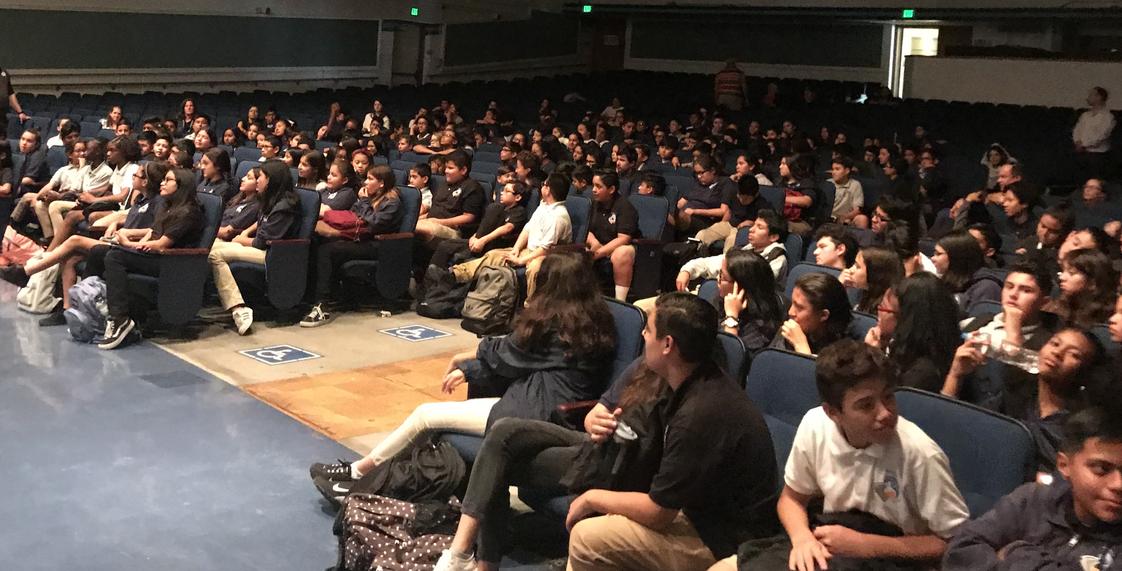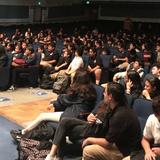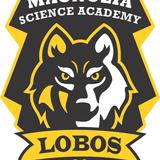Serving 218 students in grades 6-12, Magnolia Science Academy 5 ranks in the bottom 50% of all schools in California for overall test scores (math proficiency is bottom 50%, and reading proficiency is bottom 50%).
The percentage of students achieving proficiency in math is 20-24% (which is lower than the California state average of 33%). The percentage of students achieving proficiency in reading/language arts is 45-49% (which is approximately equal to the California state average of 47%).
The student:teacher ratio of 17:1 is lower than the California state level of 21:1.
Minority enrollment is 96% of the student body (majority Hispanic), which is higher than the California state average of 80% (majority Hispanic).
Quick Stats (2025)
- School Type: Charter School
- Grades: 6-12
- Enrollment: 218 students
- Student:Teacher Ratio: 17:1
- Minority Enrollment: 96%
- Graduation Rate: ≥80% (Btm 50% in CA)
- Overall Testing Rank: Bottom 50%
- Math Proficiency: 20-24% (Btm 50%)
- Reading Proficiency: 45-49% (Top 50%)
- Science Proficiency: 10-14% (Btm 50%)
- Source: National Center for Education Statistics (NCES), CA Dept. of Education
Top Rankings
Magnolia Science Academy 5 ranks among the top 20% of public schools in California for:
Category
Attribute
Community Size
Student Attention
School Overview
Magnolia Science Academy 5's student population of 218 students has declined by 12% over five school years.
The teacher population of 13 teachers has grown by 8% over five school years.
School Type
Grades Offered
Grades 6-12
Total Students
218 students
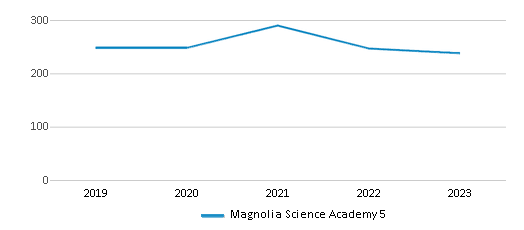
Gender %
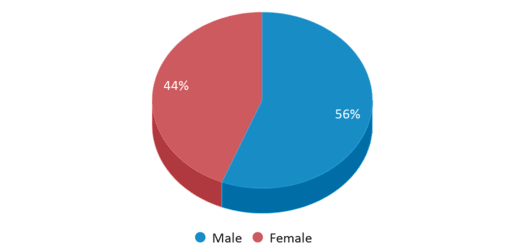
Total Classroom Teachers
13 teachers
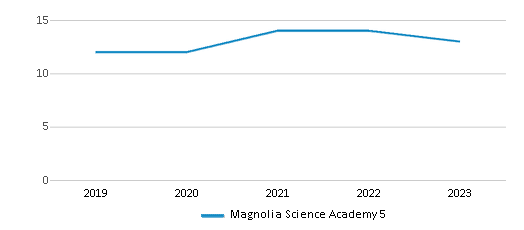
Students by Grade
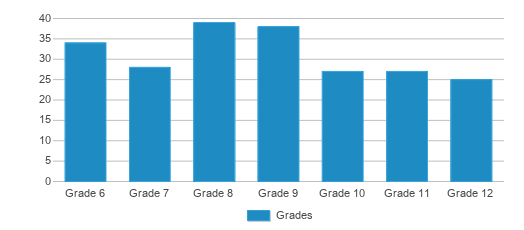
School Rankings
Magnolia Science Academy 5 ranks within the bottom 50% of all 9,602 schools in California (based off of combined math and reading proficiency testing data).
The diversity score of Magnolia Science Academy 5 is 0.19, which is less than the diversity score at state average of 0.63. The school's diversity has stayed relatively flat over five school years.
Overall Testing Rank
#4816 out of 9602 schools
(Bottom 50%)
(Bottom 50%)
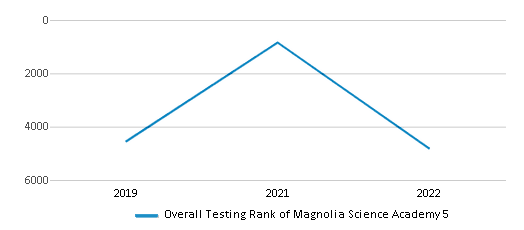
Math Test Scores (% Proficient)
20-24%
33%
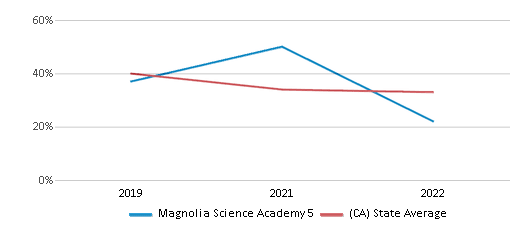
Reading/Language Arts Test Scores (% Proficient)
45-49%
47%
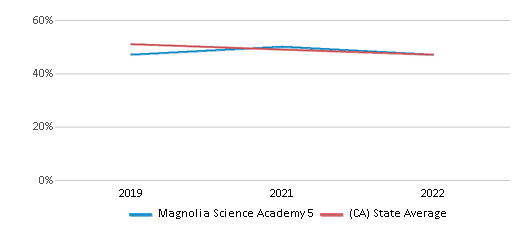
Science Test Scores (% Proficient)
10-14%
29%
Student : Teacher Ratio
17:1
21:1
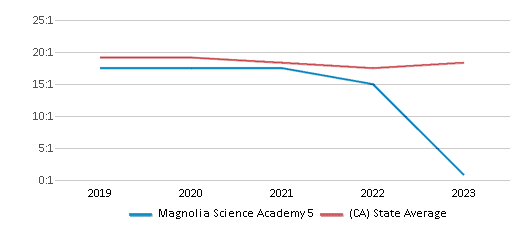
American Indian
1%
1%
Asian
4%
12%
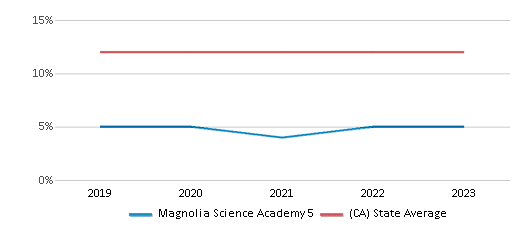
Hispanic
90%
56%
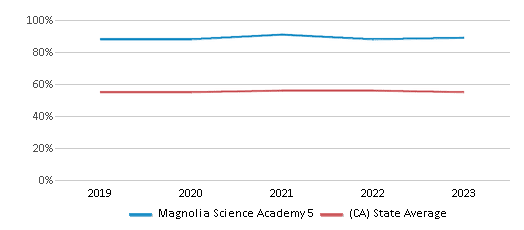
Black
1%
5%
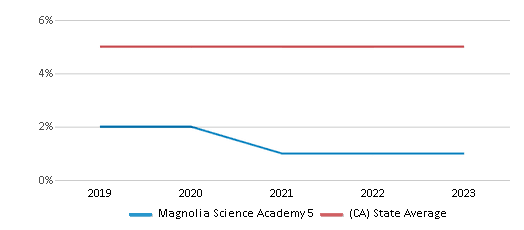
White
4%
20%
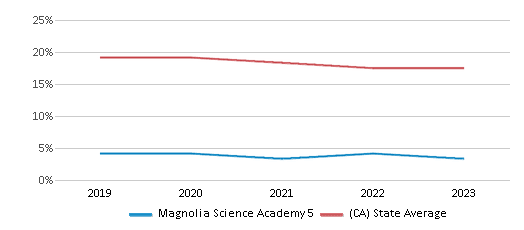
Hawaiian
n/a
n/a
Two or more races
n/a
6%
All Ethnic Groups
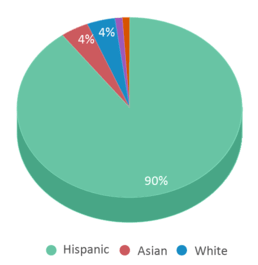
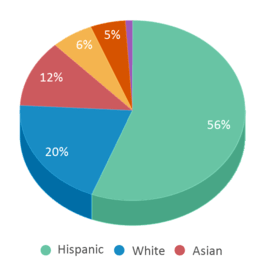
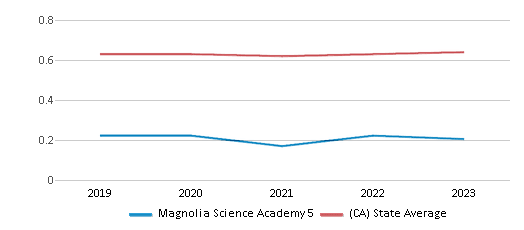
Graduation Rate
≥80%
87%
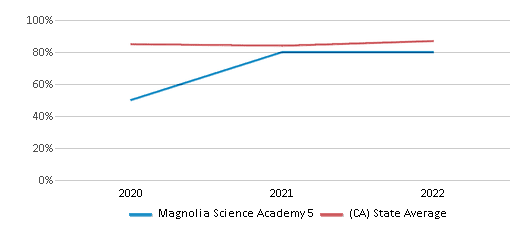
Eligible for Free Lunch
83%
54%
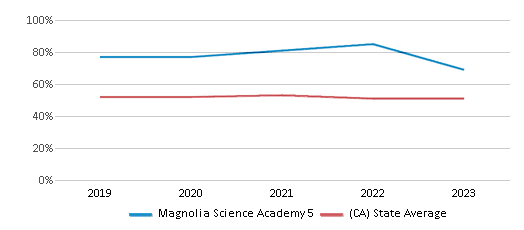
Eligible for Reduced Lunch
7%
8%
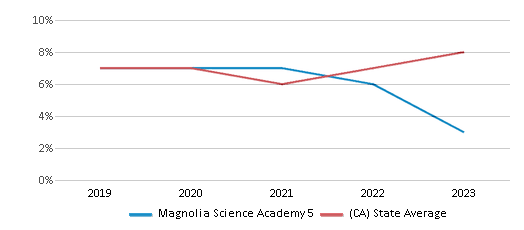
School Statewide Testing
School District Name
Sports
Total Sports Offered
4 sports
Sports
Basketball, Football, Soccer, Volley Ball
Extracurriculars
Total ExtracurricularsTotal Extra-curric.
14 extracurriculars
ExtracurricularsExtra-curric.
Club or Organization:
Advanced Math, Art Appreciation, Arts and Craft, Chess Club, Congressional Award, Dance, Eco Club, Film Club, Mindfulness Club, Music, Mystery Club, Student Council, Vex IQ Robotics, Yearbook
Advanced Math, Art Appreciation, Arts and Craft, Chess Club, Congressional Award, Dance, Eco Club, Film Club, Mindfulness Club, Music, Mystery Club, Student Council, Vex IQ Robotics, Yearbook
Source: National Center for Education Statistics (NCES), CA Dept. of Education
School Notes
- Magnolia Science Academy 5 (MSA-5 or Charter School), is a classroom-based charter school serving grades 6-12 with a curriculum emphasis on science, technology, engineering, arts and math (STEAM). Originally founded in 2008, MSA-5`s mission is to provide a college preparatory educational program emphasizing STEAM in a safe environment that cultivates respect for self and others.MSA-5 currently has 282 students in grades 6-12, and mainly draws enrollment from Reseda, CA and neighboring communities. The neighborhoods that MSA-5 serves are heavily immigrant with a language other than English spoken at home. A high concentration of the families MSA-5 serves face economic challenges. MSA-5 has a diverse enrollment, including 87% Hispanic/Latino, 5% Asian, 5% White, 3% Black or African American, 85% Socioeconomically Disadvantaged, 18% Special Education, and 24% English Learner population.MPS strives to graduate students who come from historically underserved neighborhoods as scientific thinkers that contribute to the global community as socially responsible and educated members of society. We offer a comprehensive learning experience designed to serve the needs of our students through effective site-based instruction, rich hands-on learning, and foundation skills presented in ways that are relevant and inspiring for our students. Classroom instruction at MSA-5 is supplemented by tutoring, after-school programs, and school-to-university links.
Profile last updated: 02/09/2025
Frequently Asked Questions
What is Magnolia Science Academy 5's ranking?
Magnolia Science Academy 5 is ranked #4816 out of 9,602 schools, which ranks it among the bottom 50% of public schools in California.
What percent of students have achieved state testing proficiency in math and reading?
20-24% of students have achieved math proficiency (compared to the 33% CA state average), while 45-49% of students have achieved reading proficiency (compared to the 47% CA state average).
What is the graduation rate of Magnolia Science Academy 5?
The graduation rate of Magnolia Science Academy 5 is 80%, which is lower than the California state average of 87%.
How many students attend Magnolia Science Academy 5?
218 students attend Magnolia Science Academy 5.
What is the racial composition of the student body?
90% of Magnolia Science Academy 5 students are Hispanic, 4% of students are Asian, 4% of students are White, 1% of students are American Indian, and 1% of students are Black.
What is the student:teacher ratio of Magnolia Science Academy 5?
Magnolia Science Academy 5 has a student ration of 17:1, which is lower than the California state average of 21:1.
What grades does Magnolia Science Academy 5 offer ?
Magnolia Science Academy 5 offers enrollment in grades 6-12
What school district is Magnolia Science Academy 5 part of?
Magnolia Science Academy 5 is part of Magnolia Science Academy 5 School District.
School Reviews
Review Magnolia Science Academy 5. Reviews should be a few sentences in length. Please include any comments on:
- Quality of academic programs, teachers, and facilities
- Availability of music, art, sports and other extracurricular activities
Recent Articles

What Is A Charter School?
Explore the world of charter schools in this comprehensive guide. Learn about their history, how they operate, and the pros and cons of this educational innovation. Discover key facts about charter schools, including admission policies, demographics, and funding, as well as what to look for when considering a charter school for your child.

10 Reasons Why High School Sports Benefit Students
Discover the 10 compelling reasons why high school sports are beneficial for students. This comprehensive article explores how athletics enhance academic performance, foster personal growth, and develop crucial life skills. From improved fitness and time management to leadership development and community representation, learn why participating in high school sports can be a game-changer for students' overall success and well-being.

February 05, 2025
Understanding the U.S. Department of Education: Structure, Impact, and EvolutionWe explore how the Department of Education shapes American education, from its cabinet-level leadership to its impact on millions of students, written for general audiences seeking clarity on this vital institution.


